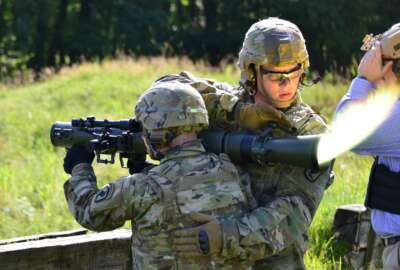
McConville nomination hearing shows how he will bring the Army into the future
Gen. James McConville has a set of new challenges to face if he takes the baton as Army chief of staff.
In a test before the Senate Armed Services Committee to become the highest-ranked Army officer, Gen. James McConville doubled down on the Army’s need to be an adaptive force as the military continues to morph its strategy for 21st century warfare.
In a Thursday hearing that covered everything from acquisition to battles in Niger, McConville seemed different than Army chiefs of staff just a decade ago by advocating for a more lenient personnel structure, an acquisition system that puts merit in failure and for giving broad authorities to soldiers who sit in front of computers.
McConville, who is slated to take over for the current Army Chief of Staff Gen. Mark Milley, would inherit an Army that fell short of its recruiting goals last year and is fighting against a low national unemployment rate as the service tries to grow its end strength in coming years.
“We need to manage millennials’ talents,” McConville said. “What I find is the young men and women today want to be part of something bigger than themselves, they want to make sure that they matter, they don’t see themselves as interchangeable parts in an industrial-age system. Part of what we are trying to do now is implement a 21st century talent management system that recognizes every person in the Army for their unique talents.”
McConville’s statement reiterates the moves Congress and the Army made under Milley to break the rigidity in the promotion system, develop a personnel information system that tracks individual talents of soldiers and takes advantage of them to better retain troops.
Last fall, the service announced it was stepping up its recruiting efforts to bring in people who would not traditionally join the Army. The service is amping up its efforts in 22 cities like San Francisco and Boston.
McConville’s challenges lie in more than just personnel, however. If confirmed, he will be the first chief of staff to oversee the new Army Futures Command in full operating capability.
“Before, we had an industrial age acquisition system,” McConville said. “It was linear. It took us a long time to get requirements in place — three to five years. Those requirements were very prescriptive to industry, it didn’t give a lot of room for innovation. It would take multiple years to get that system under contract; to test. The technology we were delivering to our soldiers was usually late. We need a much more agile acquisition system, which the cross functional teams and the Futures Command give us right now.”
McConville said the Army is now able to turn requirements in weeks or months and have industry prototype easily. He added that Futures Command is a good opportunity for the Defense Department as a whole to look at how it can better its acquisition system.
McConville will be in charge of ensuring Futures Command stays on track and is accountable to its mission.
He said the Army is evaluating Futures Command through its outcomes.
“We are looking at how long it took us before to write requirements, how long it took us to prototype, how long it took that equipment to get into the soldiers’ hands,” McConville said. “We are also looking at cost. Every dollar matters. The more we can do to have competition in the process in the near term, the less it’s going to cost.”
One final challenge McConville will face is how ubiquitous cyber is becoming in warfare and ensuring the right people stay in the jobs.
“Right now cyber is a very hot career field. If you go into cyber, you can be a four-star general like U.S. Cyber Command leader Gen. Paul Nakasone,” McConville said. “We have got to have the same type path for those professionals who go into that area. It’s very tied to the information dominance area.”
McConville supported the Army’s decision to have cyber and information warfare professions compete against each other for promotions, instead of against regular infantry officers. That way those professionals can take advantage of different career opportunities that might hurt an infantry officer’s chance for promotion.
Copyright © 2025 Federal News Network. All rights reserved. This website is not intended for users located within the European Economic Area.
Scott Maucione is a defense reporter for Federal News Network and reports on human capital, workforce and the Defense Department at-large.
Follow @smaucioneWFED




